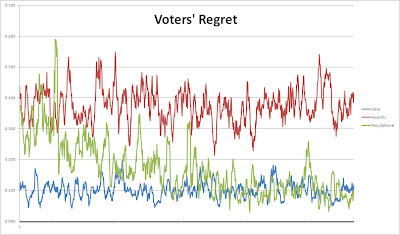 |
| I sell to leftists and rightists. I'd sell to independents but they're not the most regular customers. |
As the 2012 U.S. election season draws to a close, there have been many possible reasons proffered for why this one seems to have been particularly, historically divisive. The battle lines between Democrats and Republicans have grown deeper, wider, and more extensive than for any other election — at least any I can remember. This, despite the facts that, 1) the two parties have nearly identical ideologies, and, 2) most voters do not fully support the published platforms of either party.
One of the reasons I've heard suggested to explain this latest battle in the ideological war that began, really, back in the photo-finish election of 2000, is that we have somehow lost our respect for the truth. He who tells the biggest whopper gets the most votes. In The Truth and Nothing But...A Good Story, I wrote about how partisan lies often spread like wildfire through the Internet, propagated by people who are either too lazy to check the validity of the facts, or too cynical to care. In the latter days of the campaigns, this overt dishonesty isn't limited to the Internet, with TV and radio ads now claiming things that are blatantly, provably, unequivocally false.
What's more maddening, nobody ever seems to want to retract these lies once they're caught. The phenomena of "doubling down" and "tripling down, basically repeating the original lie louder and to a broader audience, has become epidemic. Why? Because it works! And here's how...
Think of political operatives as carnival barkers. Their job is to draw attention to a certain set of facts that favor their candidate. But the facts themselves may be dry and boring without some dramatic context. "See the man with no stomach!" they scream. The actual fact is, there's a skinny guy who can suck in his gut to the point where his spine is visible from the front, still worth the price of admission perhaps (if you're interested in such oddities), just not as catchy and seductive as the shouted hook would have you believe. Some customers, after viewing the side-show, may complain about the lie, pointing out the original claim was misleading and blatantly, provably, unequivocally false. "Pants on fire!" they exclaim. But who cares? They have witnessed something they probably wouldn't have seen otherwise, and the carnival has their $1 so everybody's happy. Meanwhile, the barker continues to shout even louder, "See the man with no stomach!"
Even carnival barkers have legal restrictions that prevent them going too far in making false claims and false implications. Under certain circumstances, their utterances can be considered to be advertising, which is regulated by the Federal Trade Commission and by similar state agencies. Under penalty of law, advertisers are not allowed to make false claims, or even misleading ones, about their products or their competitor's. The FTC defines false advertising to include the following:
means of advertisement [...] which is misleading in a material respect; and in determining whether an advertisement is misleading, there shall be taken into account (among other things) not only representations made or suggested [...] but also the extent to which the advertisement fails to reveal facts material in the light of such representations.In this campaign cycle, there have been many, many political ads, including the one linked above, that clearly would have violated FTC laws if the product being sold had been, say, soap instead of a candidate for political office. Why do we hold carnival barkers and purveyors of dish soaps to a higher standard of honesty than our presidential candidates? The answer is, the First Amendment to the Constitution of the U.S. The courts have held that political ads cannot be considered to be advertising. They are political speech, which is protected under the First Amendment. As a result, it is legal for anyone to tell any political lie, however outrageous, as loudly and often as they wish.
And, honestly, how else could it work? We certainly don't want the government telling us which political claims we should believe and which ones we should discount. The problem is really a practical one stemming, ironically, from the success the FTC has had in their enforcement of truth in advertising. I've heard people say things like, "There must be some truth in that political ad, otherwise they wouldn't let it be shown on TV." This "nanny expectation" is completely unfounded when it comes to the strange world of political advertising and no comfort whatsoever can be drawn from it. (Interestingly, the truth-in-advertising expectation does not seem to extend to the Internet, even though the same FTC laws apply there as on traditional broadcast media.)
Legally, practically, and in every other sense, it is the responsibility of each individual voter in the U.S. to research campaign ads they may find compelling to discover whether they are indeed truthful; a daunting task. The only reasonable alternative is to rely on a trusted source to do the fact checking for you. There are now legions of so-called fact checkers, and nearly every claim made by every major political candidate is combed over, investigated, parsed and re-parsed to try to determine whether it is true, false, or somewhere in between. Campaigns often shoot for that middle ground, the grey area where claims can still be sensational, provocative, even mildly misleading, without actually being so blatantly false as to reflect poorly on the candidate's public character and facade of honesty. They seem to follow some sage advice I received early in life.
How does one become a good liar?
Tell the truth almost always.
The truth is a fluid and relative thing these days. It depends on whom one chooses to believe. Even things we once called "facts", things like, "this person was born in the U.S.," or, "this person is a Christian," or, "this person never cheated on his taxes," all are now written in various shades of grey. It's not that we treasure the truth any less than before; if anything, just the opposite is the case due to increased skepticism. It's not that there are too few facts; the Internet, among other things, now provides a treasure trove of information about every conceivable topic.
The challenge, IMO, is that there are so many facts, so much information available to each of us. Facts are weapons in the political wars that currently rage in this country, and fact checkers are the arms dealers who make money selling to both sides of the conflict. Like weapons, there are high-quality facts and low-quality ones. Facts purchased from the "fact checkers" at Fox News or MSNBC are somewhat more likely to jam on you in the heat of battle or blow up in your face like a crude IED. But these aren't the really dangerous ones. The reputable arms dealers, the neutral fact checkers and think tanks sell large quantities of durable, usable information to either side for a price. In political skirmishes these days, you cannot be lulled into a false feeling of security because you are armed with the facts. The other guys are probably packing heat as well, just as much as you and maybe more. Standing up to declare victory because truth is on your side is a sure way to become a bloody casualty.
I am not advocating that fact checkers be outlawed, of course. Nor am I saying that free and open information is bad. The NRA has the right idea, facts do not kill candidates, ideologies kill candidates. An IED in the hands of a radical ideology can do more damage than an aircraft carrier in the hands of a civilized one. Wars and political debates are won not with weapons or facts, but by leaders who know what they are defending, whose loyalties are steadfast, and whose vision extends far beyond the next battlefield.













